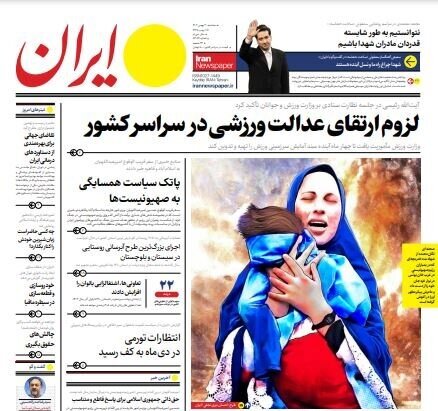American support of the assassination of Iranian advisors

TEHRAN - In a conversation with Seyed Reza Sadr al-Hosseini, an expert on regional issues, the Iran newspaper discussed the Gaza war and America's support for the Zionist regime and wrote: The West Asia region is very important for Americans.
They had already announced that they would not leave this area completely. This decision of the Americans is not unrelated to the predicament that Israel got involved in. There is no limit to the military and intelligence cooperation between the two sides, and in fact, based on the level of support it receives from the United States, Israel has also put the assassination of Iranian advisors in Syria on its agenda. While the Americans intend to reduce the strength of the resistance groups against Israel, they also want to reflect the message that instead of staying in West Asia and different countries including Iraq and Syria, they will cause serious damage to the people who are effective in expelling their forces in the fields of defense and security.
Vatan-e-Emrooz: A thoughtful response to Israel's struggling
In a commentary, Vatan-e-Emrooz addressed the deplorable situation of the Zionist regime in its long battle with resistance groups and said: Netanyahu's government is under severe political pressure from inside the occupied territories due to heavy defeats in this battle and the failure to achieve its goals. Due to the proximity of the presidential elections in the U.S., Biden is not willing to directly enter the conflict. Perhaps, from this point of view, it is possible to analyze Israel's purpose in assassinating Iranian commanders in such a way that Israel has used all its efforts to drag Iran to a direct conflict. Although the Islamic Republic of Iran has responded to these actions of the Zionists in some cases, it has avoided entering the playground designed by this regime. This approach is completely rational and forward-looking. In any case, in the hybrid war started against Iran and the resistance front these days, paying attention to public opinion, maintaining the country's prestige, and above all, maintaining deterrence power should not be neglected.
Ettelaat: Iran will not be indifferent to national security
In an article, Ettelaat dealt with Iran's missile attack on the Mossad headquarters in Erbil and quoted Iran's Foreign Ministry spokesman Nasser Kanani as saying: Unfortunately, for many years, there have been direct threats to the national security and security of Iranian citizens from this region. Iran cannot be indifferent to threats to its national security and citizens. National security, border security, and the security of Iranian citizens are a red line, and the government and the armed forces of Iran will not be indifferent to providing security and defending the security of their citizens, as they have always done. Iran's action against the headquarters of the Mossad terrorist organization affiliated with the Zionist regime was an action in line with punishing the aggressors and those who take action against Iran's security and was not an action against Iraq, the Iraqi government, and the Kurdistan Region, or an attack on the sovereignty and territorial integrity of this country. Israel should know that threats and rhetoric will be absurd from Iran's point of view and Iran will not leave any anti-Iranian action of the Zionist regime unanswered. Also, these statements should receive the attention of the international community and the Security Council, and they should react to any statements and actions against peace and regional and international security of this regime and take the necessary legal action.
Shargh: Diplomacy is the best way
In an analysis, Shargh discussed the mutual attacks of Iran and Pakistan. It wrote: After these attacks, we witnessed an unprecedented speed in the "de-escalation" of tensions between the Islamic Republic of Iran and Pakistan as well as an unprecedented speed of escalation of tensions between the two countries. According to Dawood Moeini, a senior analyst of subcontinental issues, two countries- Iran and Pakistan- are struggling with the issue of insecurity and terrorism, especially after the Taliban regained power. Considering these commonalities, these mutual attacks indicate that the situation was drawn towards unprecedented tension, but the political, economic, livelihood, and security commonalities of the two countries put Tehran and Islamabad on the de-escalation route in less than 72 hours. Although Tehran and Islamabad are now on the path of de-escalation and normalization of relations, there are still problems and challenges arising from the issue of facing terrorism and insecurity in the common borders, which can provide the platform and space for the repetition of tension. Therefore, from now on, in the shadow of diplomacy, a new chapter of coordination and bilateral security cooperation between Tehran and Islamabad will be formed to control and fight terrorism.
